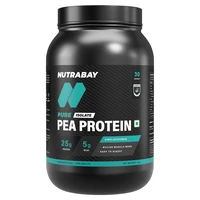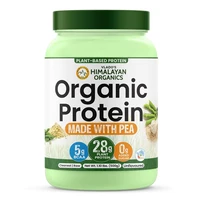Pea Protein
Pea protein is a plant-based source of nutrition made from yellow split peas. It’s ideal for vegans or anyone who’s lactose intolerant, helping you meet your daily protein needs and recover faster in the natural way.
Upto 43% OFF

Nutrabay Pure 100% Pea Protein Isolate
From
₹599
MRP: ₹669
Add
Upto 19% OFF

Nutrabay Gold 100% Pea Protein
From
₹69
MRP: ₹79
Add
Upto 54% OFF

Nakpro 100% Pea Protein Isolate
From
₹1,149
MRP: ₹2,499
Add
21% OFF

Vlado's Himalayan Organics Organic Protein Made With Pea
₹1,805
MRP: ₹2,295
Add20% OFF

Calibar Just Pea Protein Jaggery Cocoa
₹1,560
MRP: ₹1,950
Add
Shop Authentic Pea Protein Powder
Pea protein is created from yellow split peas, a legume. It is a complete protein, containing all the essential amino acids that our body needs and is also considered a good source of iron, fiber, and other nutrients. Pea protein is commonly used as a dietary supplement for building muscle, boosting energy, and aiding in weight loss. It is often used as a vegetarian and vegan alternative to animal-based protein sources.
Pea protein provides the body with a convenient, plant-based source of protein that can support various health and fitness goals.
Pea protein: Benefits & Uses
These are some of the health benefits of pea protein.
- Complete protein source: Pea protein contains all nine essential amino acids, which are necessary for building and repairing muscle tissue, maintaining a healthy immune system, and overall health.
- Gut-friendly: Pea protein is easy to digest and has been shown to support healthy gut bacteria.
- Promote healthy weight: Pea protein has been shown to help control appetite and promote feelings of fullness, making it helpful for weight management.
- Support healthy blood sugar levels: Pea protein has a low glycemic index, meaning it doesn't rapidly spike blood sugar levels, making it a good option for people with diabetes or other blood sugar-related health concerns.
- May lower blood pressure: Studies suggest that pea protein benefits blood pressure, making it a good option for people with hypertension.
- Heart healthy: Pea protein is rich in arginine, an amino acid that aids in relaxing blood vessels, which can improve blood circulation and heart health.
How does pea protein work?
Pea protein is a source of high-quality protein our body utilizes to build and repair muscle tissue, produce hormones and enzymes, and support overall health.
When pea protein is consumed, it is broken down into amino acids, which are then absorbed into the bloodstream. The body uses these amino acids to synthesize new proteins and perform various functions, such as building and repairing muscle tissue, maintaining a healthy immune system, and supporting other vital processes.
Pea protein: Types
There are two main types of pea protein:
- Pea protein isolate: This is a highly purified form of pea protein that contains a minimum of 90% protein. It is extracted by removing most carbohydrates and fat from yellow split peas, leaving behind a highly concentrated protein powder. Pea protein isolate is often used in dietary supplements and protein bars, as it delivers a high-quality source of protein in a concentrated form.
- Pea protein concentrate: This less purified pea protein form contains between 70-80% protein. It is also low in carbohydrates, dietary fiber, and fat, but not as less as in the isolate form.
How to choose the right pea protein for you?
When choosing a pea protein, consider the following factors:
- Look for a pea protein sourced from non-GMO and organic yellow split peas. Also, prefer a product that has been lab-tested to ensure its safety and purity.
- Consider the protein content of the pea protein you choose. A higher protein content generally means a more concentrated source of protein.
- Although pea protein powder is hypoallergenic, the composition may contain other ingredients. In case of a food allergy or intolerance, check the allergen information on the product label to ensure that it is suitable for you.
- Always go for a well-reputed brand like Nutrabay, which provides high-quality products.
How to use pea protein?
One can use pea protein in the following ways:
- Pea protein powder can be added to water, milk, or other liquids to create a quick and easy protein shake. For extra flavor and nutrition, one can add other ingredients, such as fruits, nuts, or peanut butter.
- Pea protein can be used in baking recipes as a protein-rich substitute for flour.
- Pea protein powder can be added to smoothies or homemade protein bars for a protein boost.
- It can be used as a thickener in soups, sauces, and gravies.
Where to buy pea protein?
You can visitNutrabay to buy the best pea protein powder in India. Nutrabay provides you with the best prices and deals on all brands, making it one of the most affordable options for purchasing supplements. You can be assured of 100% genuine products and the best protein bar price with Nutrabay, as each one is sourced from the brand directly.
Best pea protein online
Nutrabay Pure Pea Protein Isolate is one of the best pea protein powders. This high-quality vegan plant protein powder is dairy-free, allergen-free, easy to digest, and great tasting. It provides 25.3 grams of protein in a single serving and is free from all artificial ingredients, additives, colours, flavours, and preservatives.
Is pea protein safe to use?
Pea protein is generally considered safe for most people when used in moderation as a supplement to a balanced diet. Pea protein is a plant-based protein source free from common allergens such as dairy, soy, and gluten, making it a suitable option for individuals with food allergies or sensitivities.
However, some individuals may experience digestive issues such as bloating, gas, or abdominal pain after consuming pea protein.
Frequently Asked Questions (FAQs)
1. Is pea protein gluten-free?
Yes, pea protein does not contain gluten.
2. Can pea protein be used for weight loss?
Pea protein can support weight loss as a high-protein diet can help to increase feelings of fullness and reduce overall calorie intake. However, weight loss ultimately depends on a balanced diet, regular exercise, and other lifestyle factors.
3. Which is better - pea protein vs. whey protein?
Pea protein and whey protein are both sources of high-quality protein, but there are some main differences between the two:
- Pea protein is free from common allergens such as dairy, soy, and gluten. On the other hand, whey protein may not be suitable for those with dairy allergies or lactose intolerance.
- Some people find pea protein to have a slightly bitter taste and gritty texture, while whey protein is generally considered to have a mild, neutral taste and smooth texture.
- Pea protein is high in protein, fiber, and essential amino acids but is lower in certain amino acids compared to whey protein. Whey protein is also a rich source of branched-chain amino acids (BCAAs) and is rapidly absorbed by the body.
Both have their benefits. Hence, the selection between pea and whey protein will depend on the individual's dietary needs, goals, and preferences.
- Nutrabay Pure 100% Pea Protein Isolate₹599
- Nutrabay Gold 100% Pea Protein₹69
- Nakpro 100% Pea Protein Isolate₹1,149
- Vlado's Himalayan Organics Organic Protein Made with Pea₹1,805
- CaliBar Just Pea Protein Jaggery Cocoa₹1,560




